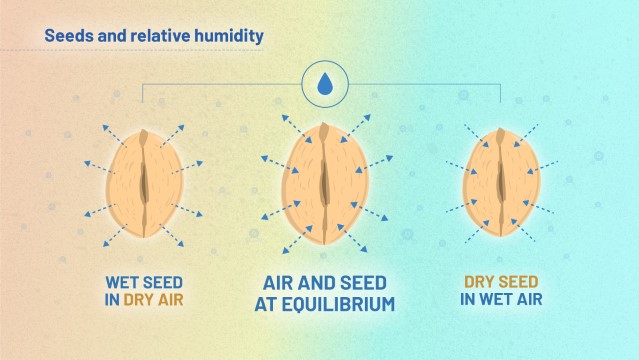Why does water activity matter?
Water activity is important because water is required to promote the aqueous (water-based) reactions that are essential to the seed’s metabolism. The type of reactions that can take place depends on the amount ‘free water’ inside the seeds. If the moisture content is high, reactions can take place readily within the seed, but in the context of a genebank, rates of spoilage also tend to be higher. If the moisture content is low, this reduces the scope for chemical reactions to go on within the seed, meaning the seeds can be stored for longer.
Most seeds are hygroscopic (they readily take up and retain moisture). Water will move in and out of the seed in order to reach equilibrium with the humidity of the surrounding air. If you consider the seed and the air around it as a system, this system will tend towards equilibrium between water in the air and water in the seed, as Figure 2 shows.

This is important because seeds behave in different ways, depending on their moisture content. We will look at the underlying mechanisms later, but let’s first think about visible behavior of the seeds. Table 1 summarises how seeds are likely to behave under conditions of low, medium and high moisture content:
| Low moisture content | Assuming temperature is constant, seeds with low moisture content survive for a long time because their metabolism is barely ticking over. They will not germinate. |
| Medium moisture content | As the seed’s moisture content increases, rates of many aging reactions increase, resulting in damage to nucleic acids, proteins and lipids. |
| High moisture content | Seeds with high moisture content are fully metabolically active. They are able to respire if oxygen is available, and to gear up for germination, including the repair of damaged macromolecules. If environmental conditions are appropriate, they will show their viability. In a storage setting, relative rates of spoilage may be higher, because of oxidation and the growth of yeasts and bacteria.
|
Table 1: changes in seed behavior with moisture content
At different stages in a genebank’s operations, it is desirable for seeds to behave in different ways. During storage, minimal metabolism is important, whereas during regeneration, the seeds must be metabolically active. To this extent, controlling the moisture content of seeds is key.
Alternatives to the gravimetric method
